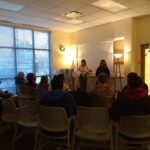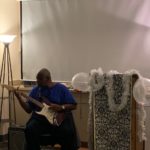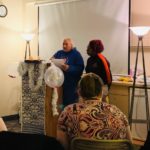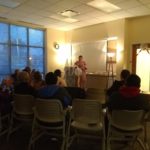Open Mic Nite at Metropolitan Southeast Chicago
Albert, a client of the Adult Mental Health Program at our Southeast Chicago Center, wouldn’t normally have participated in an Open Mic Nite, but he thought it would be an interesting opportunity. “It was therapeutic, challenged me to rise to something I normally wouldn’t rise to,” he says.
Clients and staff came together to support each other in performing during Open Mic Nite, held at the Southeast Chicago Center.
“Hope is the power to believe that anything is possible. A fresh start, a second chance, or to wish upon a miracle. With hope, there is that window of opportunity of a new life for reassurance that the possibilities are endless and as long as you believe, anything can happen.”
Rushini Jayawardena, LSW, a Social Worker in the Adult Mental Health Program, came up with the idea because it’s something she’d enjoy herself. “I also recognized the need for a less rigid environment for social interaction and self expression,” she says.
Her co-organizer, Nathalie Macias, MSW, a Mental Health Practitioner in the program, adds that events like these “can help clients see that they are more than a diagnosis and that there are various paths to healing.”
With the support of his fellow participants and the staff, Albert felt a sense of camaraderie. “You didn’t just clap politely,” he shares, “you really engaged us.”
Thank you to the people who bravely shared their art, and to all program participants and staff who supported them.
Katlynn Bush, Senior Clinical Program Supervisor in the Adult Mental Health program at Metropolitan Southeast Chicago, spoke to Albert, as well as Rushini and Nathalie. Read their conversations below:
Interview with event organizers Rushini Jayawardena, LSW, Social Worker I and Nathalie Macias, MSW, Mental Health Practitioner
How did you come up with idea to host an Open Mic Nite event in a behavioral health program?
RJ- My usual source of inspiration for groups/workshops with clients are derived from what I imagine myself enjoying as a client and what I currently enjoy doing independently. I also recognized the need for a less rigid environment for social interaction and self expression which inspired the Open Mic theme.
NM- Rushini came up with the idea and I was excited to co-facilitate with her because it seemed like a very different type of group event. It did seem to be freer flowing and I think there is a lot of value in that.
How do you think these types of interventions support an individual’s recovery?
RJ- I believe these interventions support recovery because they provide a more organic space and approach for clients to express themselves. Being able to see clients engage and move through social and artistic spaces give both the client and the clinician an opportunity to disengage from the monotony of one-on-one therapy and see each other as individuals of a larger community which helps normalize and promote recovery.
NM- I think these types of interventions support an individual’s recovery because they celebrate their strengths and help foster human connection. I think they can help clients see that they are more than a diagnosis and that there are various paths to healing.
What feedback did you get from those who attended, especially clients?
RJ- Clients shared having enjoyed the opportunity to gather, watch and perform. Clients who were nervous were able to combat their anxieties and perform their pieces in front of people they cared about. Additionally, clients shared having spaces and opportunities like this allows for them to be heard and seen in a way they feel is silenced and rejected in their home environments.
NM- Many people shared that they really enjoyed the event. Clients commended each other. Someone shared that they were able to present a very meaningful and deep piece of art.
How do these types of interactions with clients affect your working with them or how you conceptualize the needs of clients?
RJ- Being able to see clients in different contexts helps me get a better conceptualization as to how they are received by others as well as how they portray themselves. These more natural environments allow for more clinical insights of the client, which can help clinicians in addressing themes in therapy. We rely heavily on client reports which can sometimes be skewed due to experiences; this space offers clinicians the chance to validate and challenge client perceptions as needed.
NM- These types of interactions remind me that clients are the experts in their lives. They help me rethink how I might be able to support clients in developing and using their strengths to address their needs.
Interview with Mr. Albert, a participant in the event
Why did you participate in Open Mic Nite event?
Mr Albert- This is something I normally wouldn’t do but I thought it would be fun and interesting. I wanted to challenge myself to get out of my comfort zone and thought it would be therapeutic for me.
What benefit do you see to doing activities like this as part of behavioral health services?
Albert- It was therapeutic, challenged me to rise to something I normally wouldn’t rise to. I liked how everyone had a camaraderie during the activity, even though I didn’t know anyone who was participating. It was great to interact with the staff in a different way.
How do you think your participation in this event changed your relationship with your therapist or how your therapist sees you?
It definitely changes the relationship and how a therapist would see me – being able to see me doing something I usually don’t do in [therapy]. It changes the way I see my therapist and you all…I see you all [staff who attended] as very supportive, you didn’t just clap politely, you really engaged us. I think you should do it a regular basis.




